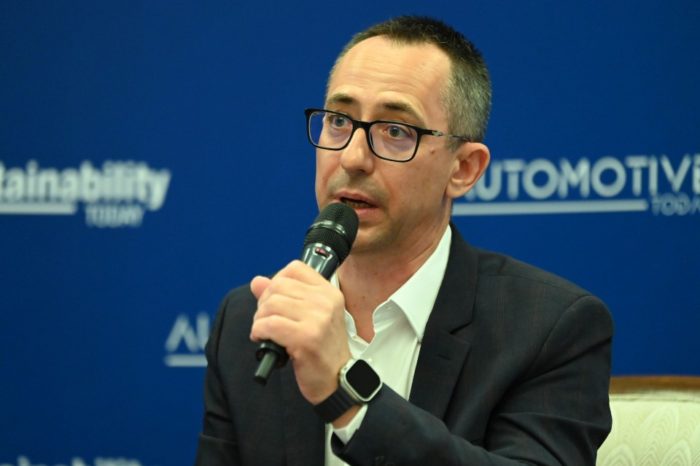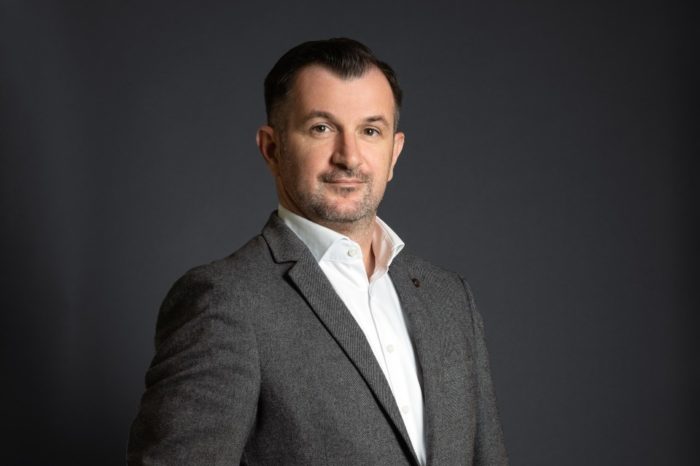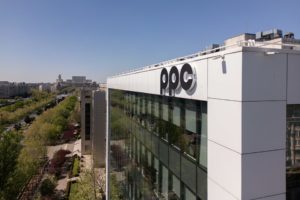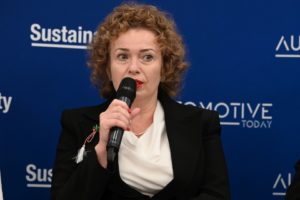INTERVIEW Alina Necula, Lion’s Head: “We are interested in launching our first logistics project in Romania”
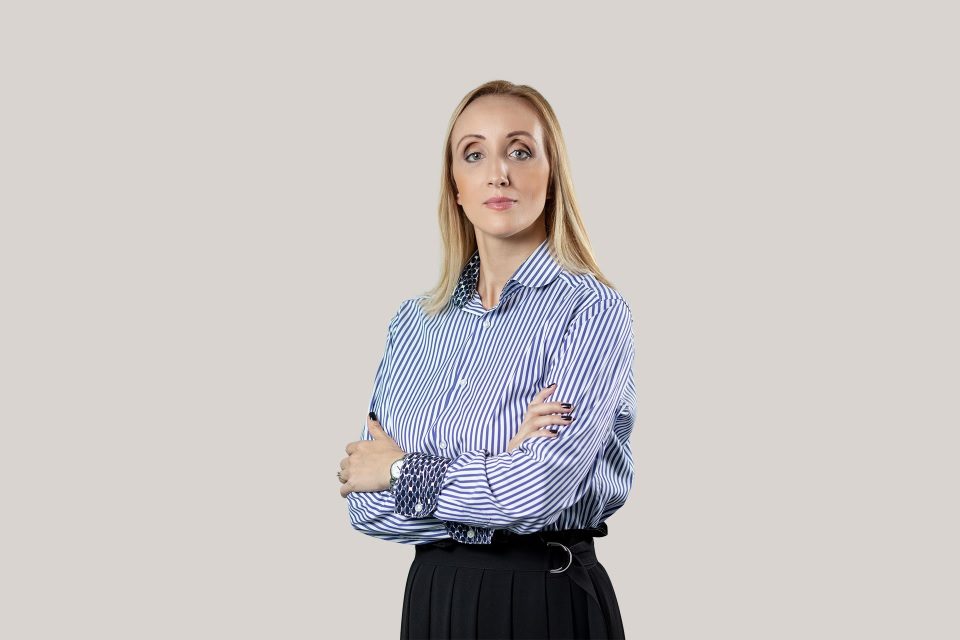
“In real estate, we stand in front of a new era. On the office sector, for instance, it’s a new approach for players who have understood that a workspace should no longer be about raised floors and modular partitions. We are moving from space providers to service providers, and companies that occupy these spaces are not just tenants, but permanently assisted customers,” Alina Necula, Country Manager Romania Lion’s Head told The Diplomat-Bucharest.
“Today, the best offices are destinations as a fact, experiences that go far beyond the traditional desk and chair, but rather a balanced combination of personalized service and community building in order to take professionals out of home or of a coffee store and bring them back in the office premises.”
What is your company’s business approach in the current real estate context?
A close, permanently customized, and mutually fair approach with all our business partners and, mainly, with the companies based in our projects. Never grow a relationship with your tenant on day 1 of your lease agreement and, further on, 5 or 7 years later, when the contract is close to termination. Otherwise, you, as landlord, become unable to understanding your tenant’s needs.
It is vital to keep close to your tenants, understand their business plans, their space needs and be a phone call away when they plan to expand/ narrow down their activity. This way, you will be able to plan your space distribution properly, have buffer or plan B solutions whenever space changes appear, ask the companies on medium-term plans on contract signing to know how to plan your occupancy strategy.
Long story short, space flexibility means landlord flexibility and acting as a dynamic, alive partner to your tenants. To Lion’s Head, this direction is more of a mantra in the upcoming period rather than a business strategy aiming at office spaces. When discussing the local Romanian portfolio, for instance, this is our new modus operandi, shifting from providing office space to better understanding our tenants journey within a physical building and creatively translating this into office space experience. Therefore, we act as a 360-degree operating cell acting to supplying a community environment, networking and trading opportunities and multi-functional premises.
What are the market tendencies in 2023?
In real estate, we stand in front of a new era. On the office sector, for instance, it’s a new approach for players who have understood that a workspace should no longer be about raised floors and modular partitions. We are moving from space providers to service providers, and companies that occupy these spaces are not just tenants, but permanently assisted customers. Today, the best offices are destinations as a fact, experiences that go far beyond the traditional desk and chair, but rather a balanced combination of personalized service and community building to take professionals out of home or of a coffee store and bring them back in the office premises.
The environment and the workspace become a qualitative extension for the retention and motivation of the companies’ staff. So, one trend we can underline is the landlord’s influence and HR-related issues extension in relationship to its tenants.
The ESG topic and policies’ implementation is a hot topic on the agenda nowadays. The one to gain points from such projects are exclusively those real estate developers to convert policies on paper into relevant measures to improve tenant life quality in the office, taking the shift from legislation to relevance.
Obviously, the logistics sector remains the pearl of the Crown, with a concentration of logistics parks in the Bucharest area and a competition regarding delivery times. Bucharest is Europe’s 5th city in terms of development and opportunities when it comes to logistics so new investments are certainly on radar.
What does a real estate company need to do to be successful in doing business in Romania?
Listen and prove capable to translate this active listening from paper to real life. We have entered a market of well-established landlords, with no new projects to be delivered in 2024 on the office sector. Thus, the quality of a partnership is to come first rather than the quantity. To us, yet we take the “O” from “obstacle” and put it into “opportunity”, seek for being flexible and keeping the right pace for the market needs. There is a lot of potential in the local market, especially in this challenging period for the key sectors, office, and investment, which benefits those who are bold and creative.
The local office sector seeks for repositioning itself, considering the macroeconomic context, remote work, as well as the lack of new delivered office spaces. Even so, companies remain cost-conscious, lease renewals and flight-to-quality relocations were the main drivers of demand this quarter.
What are the most important assets of Lion’s Head?
I would refer here both to our existing portfolio, as well as to the factors that stand beyond this portfolio. In Romania, there is Oregon Park as the company’s flagship project, a premium A-class office complex comprising three 7-storey buildings that provide over 70,000 sqm of contemporary office space surrounded by an attractively landscaped plot of nearly 4 ha. Another company’s flagship projects, in Bulgaria, is the redevelopment of Sofia’s historic landmark Polygraphia Office Center, as well as Megapark Sofia, a class A office project with excellent location on the major Sofia boulevard connecting Sofia Airport with the CBD.
Yet, what stands beyond this list of assets are two main aspects that turns Lion’s Head more into a service provider rather than space provider. First come the professionals in the company’s team – senior-level, professionals, easy-to-adapt persons, having a corporate background and an easy understanding of our partners’ needs. We have managed to create local compact problem-solving teams. What is more is the partnership we have nurtured with our tenants that have become business partners rather than clients. In Oregon Park, for instance, we have recently dealt with numerous lease contracts terminations and yet we managed to renew more than half of the projects’ overall surface, keeping the companies with us also for the upcoming period.
What are the key benefits that every project should have to attract tenants?
The key stands in properly balancing a mix of both technical and business features. We long exceeded the phase when an office lease deal was exclusively about technical specifications or rent/ square metre. Potential tenants now take into consideration the landlord’s flexibility and his ability to customize the space according to the company’s needs, the capacity of acting business-wise and understand the operational needs of the tenant.
Moreover, the location and construction features of a building still stay in place. Companies pay even more attention to the building’s accessibility since they are interested into granting their employees fast and easy access to their workplace, as well as additional facilities available at hand, from retail to wellness etc. Furthermore, in Oregon Park’s case, we are very cost-oriented and optimizing everything. We have all the technical instruments to do that, so the tenants pay a fair value for money for their space, this being a benefit companies generally appreciate.
The ESG factor takes the limelight more and more these days. A certification ESG-related recognizes the implementation of a set of measures to ensure a working environment with a positive impact on the health and well-being of employees. Obtaining it proves the project provides office space that helps tenants attract and retain talent in the company, as well as an environment conducive to increased productivity. Most of the times, it is more difficult to implement measures increasing the ESG factor of an existing building that having them in mind when erecting a building from scratch. Thus, in order to successfully reach such target for standing portfolio, as the case of Oregon Park, I think it is necessary to find a balanced ratio between understanding the technical side of this action and the limitations of your building, as well as choosing those improvement measures that are relevant to your tenants.
How would you describe your business development on the local market?
To put into simple words, I would refer to the company’s business development as mature, steady, substantial. It stays in Lion’s Head DNA to act according to the market’s local needs and understand the business profiles and the targeted companies operating here. We, as a company, enter markets to stay and grow progressively, not to kick and run, be attentive to local sector trends and opportunities and generate new business gradually. This is why, in Romania, we entered the market on the office sector and now find ourselves in a “ready-steady-go” position for expanding our operations on other real estate sectors.
What are your short and medium-term plans in Romania?
We can confirm the company’s interest in launching the first logistics project in Lion’s Head portfolio in Romania and we pay special attention to the southern neighbourhood of Bucharest. Now, however, we are in the planning phase and analysing the feasibility of several work options and cannot provide specific details.
The development of the logistics sector has been on the company’s radar at group level in recent years due to the good revenues it offers, so the expansion of these plans including the Romanian market came naturally.
Although we managed to adapt brilliantly to the challenges generated by the pandemic crisis and the change in working habits, a diversification of the portfolio is a balanced strategy at the business level that will most likely materialize in the next 12-18 months.
Furthermore, we keep as key objective maintaining a 100% occupancy rate for Oregon Park. We boast ourselves with recent major new leases, as well as office space renewals and intend to also secure the spaces that are close to termination period in the upcoming period.

